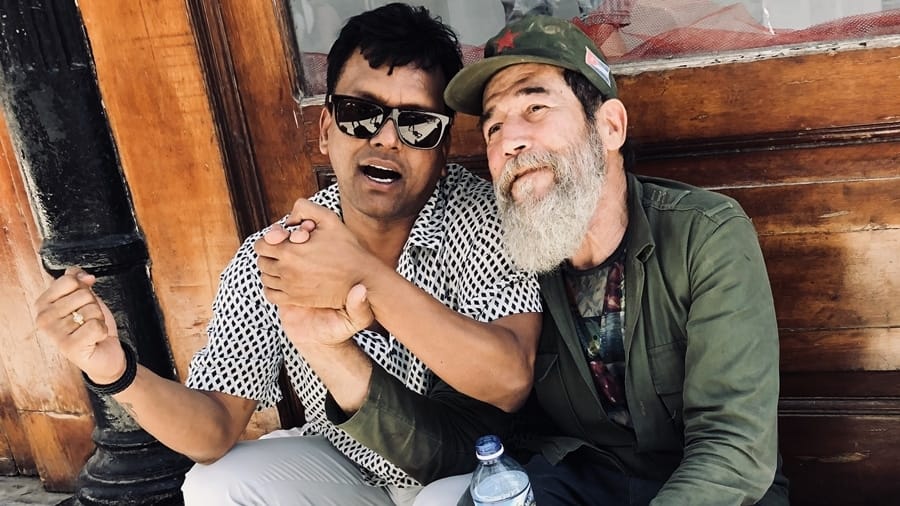Month: August 2019
Cuba and the book a German wrote.
Look, I have always
wanted this snap.
Once for romantic
ideological reasons.
Now for romantic nostalgic reasons.
I mean, all of us were
young once and loved
this story, right?
Viva la revolución!
Am a passionate man. But I have an issue
with intense passion – it leads to blindness.
We are so carried away by our truth that
every other truth becomes the enemy.
That truth becomes the core of our existence.
Religion, nationalism, ideologies, all of them
do this to us – trap us in a web of our own making.
A web we will lose our lives protecting.
Were Marx, Castro and El Che right? They were.
But the problem is that they found
everyone else wrong. Their followers, still do.
Teachers, doctors
and law enforcement
are among the best paid.
At about US $20 – 25 a month.
I agree with the theory.
Not the numbers.
Just 90km across the pond is Key West,
Florida – the land of plenty. Or depending
on who’s looking, the land of the enemy –
capitalists, imperialists and the bourgeois.
Whose lives got transformed because
a Scotsman wrote The Wealth Of Nations.
One set read Karl Marx, set off on one path,
the other read Adam Smith and went exactly
the other way. That is what history tells us.
But we are in 2019 and what have we learnt
from these socio-economic re-engineerings?
The world stands poised at the crossroads,
all of these theories have run their course
without delivering the Promised Land.
What’s next?
Amazing how
our lives can
get blessed or
get screwed
depending on
who writes the
book and who
reads it.
Jobless growth,
hyper- nationalism,
growing literacy,
a widening
economic divide,
an educational
system that is
still thinking
Industrial Revolution,
the social media uni,
longer life- spans….
If ever we needed a guiding light,
a socio-economic theory and model
that accommodates all, we need it now.
Natural selection brought us here. Artificial selection will take us forward
Raymond Interchange 2019
INK Social
Man, Machine and everything in between
Opinion: It’s your bubble to break: Social media change our opinion
Around election time, fake news was the new weather — a nice, neutral conversation starter. Having started, we will blah on to blame social media for all our ills (hypochondria included).
Humans have always been too eager to condemn; scapegoat identification should ideally be at the Games. As soon as stories of the American elections hit the stands — with Russia and then Cambridge Analytics playing substantial character roles — we found the culprit, social media. But this is unfair. Let’s look at social media in the news context.
Before social media, news had four roles. To inform people about events happening around them, to educate about the relevance of these events, to provide Governments a platform to reach citizens and of course, to share different perspectives. (And do all objectively.)
And then social media came along and boom! We moved from monologue to discussion. We had a platform for open discussions in the public sphere that could facilitate public opinion. What a marvellous opportunity that was (and I still hold, is).
So what did we do? We converted this platform for open discussion into a polarised, hate-filled, abusive contest about who are right and who wrong. And this definitely is influencing our elections. But not, I would think, in the way we claim it is.
I think we are too far gone to let what we see on social media change our opinion. So, is fake news changing who you would vote for? I think not.
But here’s what fake news really does.
Social media is algorithmically engineered to personalise content for you – which means the machine gets smarter and smarter at showing you more and more of what you like (and are likely to like).
Don’t be surprised to find your opinion repeated wherever you go on social media; your TL, is just a mirror. The more we find our opinions repeated, the more convinced we become that we are right – this is exactly how an echo chamber works.
Now into this charged scenario, along comes fake news. If it confirms what I believe in, it becomes gospel truth to prove my already polarised beliefs. If it does not, I immediately dismiss it as fake news.
For in the process, we have also managed to redefine fake news. Fake news is no more an untruth. Fake news is now something you find unpalatable and unhelpful to your cause. What agrees with you, is never fake news. It is at worst, as Kellyanne Conway put it, an ‘alternative fact.’
Therefore, in my mind, fake news is not changing my views but is confirming my already polarised beliefs. A political party might not be able to employ fake news to get new voters, but it most definitely can make old voters even more committed.
Recently, Facebook announced substantial grants to 60 researchers from premier institutions, to study the impact of social media on elections worldwide. For this, it also provided access to privacy protected data. I don’t know whether I should laugh or cry at this lame attempt. This is like Stalin announcing a 3-minute coffee break in the Gulag.




































